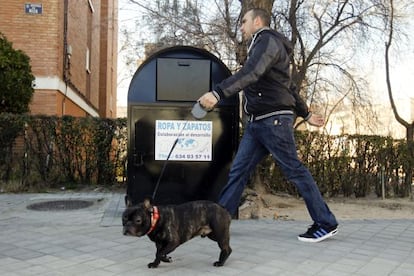When fair trade rags are a scam
Most of Madrid's clothes-recycling bins are put in streets by pirate operations, says consumer organization Charity organizers encourage cautious giving


The crisis has another, kinder side: solidarity with those in need. These long months of scarcity have not been bad for donations, which remain at stable levels, or for volunteer work, which is enjoying an era of plenty. But where is all this charity going?
The OCU consumer group has released a study warning about the proliferation of used-clothes collection bins in metropolitan areas across the country. The criticism is due to the fact that many of these donation boxes lack city authorization, and that some of them are misleading, suggesting a non-profit goal when they are in fact completely for-profit. The report says this practice hurts the real non-profits and the recycling companies, and "constitutes a betrayal of citizen expectations."
A single bin can bring in annual revenues of 3,500 euros, considering a ton of used clothes is sold on the market for 350 euros. "And these organizations place more than one collection bin in the cities, so that their revenues are multiplied by as much as 10 or 20 times," says OCU.
This practice is above all detrimental to an umbrella group called Asociación Española de Recuperadores de Economía Social y Solidaria (Aeress), which works with at-risk individuals, giving them jobs collecting, treating and reselling used clothes.
In Madrid, 14 out of the 16 bins examined for the report were unauthorized.
"All of our entities work legally, and our goal, besides recycling used products, is training and providing employment to people at risk of social exclusion," explains Laura Rubio, Aeress coordinator. The association brings together 23 organizations across 12 regions in Spain and provides 863 jobs.
The Aragon branch of the Catholic charity Cáritas is also unhappy. "Our project provides jobs for women through clothes recycling. These people learn skills like keeping to a schedule, workplace discipline or sewing, and they receive money for their work," explains project coordinator Jesús Luesma. These clothes are later sold across the region at stores called A todo trapo, and the money made on the sales reverts to Cáritas.
OCU analyzed the situation in four major cities - Madrid, Barcelona, Valencia and Seville. In Madrid, 14 out of the 16 bins examined for the report were unauthorized. Many carried no identification whatsoever, and those that did were unable to provide a coherent explanation when OCU analysts called the telephone number provided.
Humana is a group that knows a lot about this issue. It has authorization from the city of Madrid to collect used clothes, and a spokesman said that the pirate bins only do damage. "Our activity loses credit, because people slowly come to feel that there is something dark behind all this."
Our goal is to provide employment to people at risk of social exclusion"
Humana has 6,000 collection bins across Spain. The donations get sorted, and part of the clothing is sold at its thrift stores, while another portion goes to Humana stores in Africa, especially Mozambique. "In those countries, nearly 90 percent of the population cannot afford new clothes," said the Humana spokesperson. The group sorts around 9,000 tons of clothes a year, around half of what it collects. The other half gets sold by the kilo. The group says that between 3,000 and 4,000 people in Mozambique live off this trade, and that the money they collect is invested in development projects in that country, especially in agriculture and education.
Humana's activities have come under fire in the past - they were investigated in several European countries on suspicion of sending millions of euros in profits from sales to tax havens, besides other charges. But now the company shows off its "audited" accounts: 15.4 million euros in revenues and the same amount in expenses and projects.
But not everyone agrees with this type of activity. Cáritas' Luesma believes that "it breaks the balance of indigenous commerce and breaks the markets in some countries, especially the ones with a textile industry," he says. "In any case, people should know if the clothes they are donating are going to be sold in the Third World and if it is a for-profit activity."
Tu suscripción se está usando en otro dispositivo
¿Quieres añadir otro usuario a tu suscripción?
Si continúas leyendo en este dispositivo, no se podrá leer en el otro.
FlechaTu suscripción se está usando en otro dispositivo y solo puedes acceder a EL PAÍS desde un dispositivo a la vez.
Si quieres compartir tu cuenta, cambia tu suscripción a la modalidad Premium, así podrás añadir otro usuario. Cada uno accederá con su propia cuenta de email, lo que os permitirá personalizar vuestra experiencia en EL PAÍS.
¿Tienes una suscripción de empresa? Accede aquí para contratar más cuentas.
En el caso de no saber quién está usando tu cuenta, te recomendamos cambiar tu contraseña aquí.
Si decides continuar compartiendo tu cuenta, este mensaje se mostrará en tu dispositivo y en el de la otra persona que está usando tu cuenta de forma indefinida, afectando a tu experiencia de lectura. Puedes consultar aquí los términos y condiciones de la suscripción digital.








































